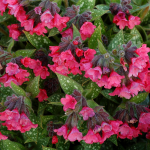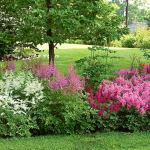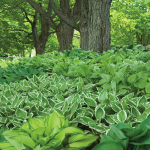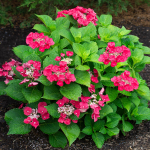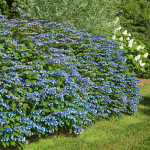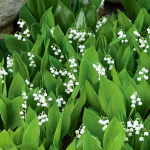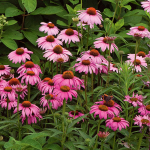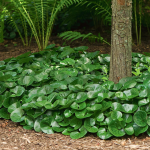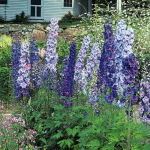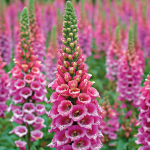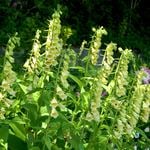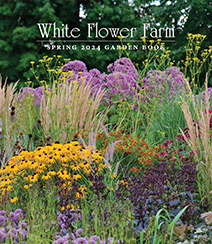Product Details
Convallaria majalis 'Rosea' is a charmer that bears all the winning characteristics of the Lily-of-the-Valley genus, including the delicate, pendant flowers with intoxicating fragrance and the ability to provide a graceful ground cover. The only difference here is the flowers are pale mauve pink.
The genus Convallaria contains a single but well-loved species, C. majalis, which is among the most useful ground covers for shade. These charming and richly fragrant plants have many bell-shaped flowers in late spring. In the garden, they spread diligently and will prosper in low light. Culture is the same as that used for all woodland plants—a woodsy soil (one rich in humus) and a location in shade or well-filtered sunlight.
For more information on growing and care, click Growing Guide.
Shipping
HOW PLANTS ARE SHIPPED
The size of the plants we ship has been selected to reduce the shock of transplanting. For some, this means a large, bareroot crown. Others cannot travel bareroot or transplant best if grown in containers. We ship these perennials and annuals in 1 pint pots, except as noted. We must point out that many perennials will not bloom the first year after planting, but will the following year, amply rewarding your patience. We ship bulbs as dormant, bare bulbs, sometimes with some wood shavings or moss. Shrubs, Roses, vines, and other woody plants may be shipped bareroot or in pots. The size of the pot is noted in the quick facts for each item.
WHEN WE SHIP
We ship our bulbs and plants at the right time for planting in your area, except as noted, with orders dispatched on a first-come, first-served basis by climate zone. We also ship a wide range of containers and planters, tools, supplies, fertilizers, garden wear, garden decor items, as well as indoor decorations like wreaths and dried bouquets when available. Estimated dates for shipping are indicated in the green Shipping Details box for each item. Please supply a street address for delivery. Kindly contact us with two weeks notice, if you'll be away at the expected time of delivery.
OUR GUARANTEE
We guarantee to ship plants that are in prime condition for growing. If your order is damaged or fails to meet your expectations, we will cheerfully replace or refund it. Please contact our Customer Service Department at 1-800-503-9624 or email us at [email protected]. Please include your order number or customer number when contacting us.
Reviews
Average Customer Rating:
 (5 Reviews)
Write a Review
(5 Reviews)
Write a Review
Sort by:
Lily of the Valley "Rosea" 
A viewer from Roanoke, Virginia
Thank you White Flower Farm!
P.S. Of the three originals, one came up and is doing nicely. Sincerely, Caren B
4 of 4 people found this review helpful. Do you? yes no Certified buyer
:( only one came up :( 
A viewer from Babylon, NY USA
I am sorry to learn you did not have success with the Convallaria Kathleen. As the plants are guaranteed I will be contacting you via email regarding compensation.
Sincerely,
Cathy
13 of 15 people found this review helpful. Do you? yes no Certified buyer
Growing guide
Latin Name Pronunciation: kon-va-lair'ee-uh
These charming and richly fragrant plants have many bell-shaped white flowers in late spring. They are hardy perennials and thrive in zones 3 through 7, but labor in the South. Easily grown, these small plants will take a couple of years to establish and may not flower the first year. Plants will keep spreading, so you may want to locate them in a contained area.
Planting Bareroot Plants: We ship dormant plants that are kept moist by shredded paper and plastic wrapping. Do not remove this packing material until you are ready to plant. If you must delay planting, the plants can remain in their original packing for 5-7 days. Keep them cool (but above freezing) and out of direct sun. Check for moisture and if dry, add water and pour off the excess. Once you are ready to plant, remove the packing material. Place each pip (the pointed bud that produces new leaves and flowering stalks) in the planting hole about 1 inch below soil level. Spread the roots out around the pip like the spokes of a wheel. After covering with soil, firm lightly and water thoroughly. Space pips about 6in apart.
Light/Watering: Lily-of-the-Valley relishes well-drained but moist soil and does best in partial shade. It will grow in the sun if soil moisture is consistent, but the foliage may not look its best.
Fertilizer/Soil and pH: These easy-going plants are not particular as to soil conditions, but grow best with a soil rich in humus that is slightly acidic. Feed lightly in spring, and mulch with compost or well-rotted manure in early fall.
Pests/Diseases: These plants are generally quite healthy and vigorous. Fungal leaf spotting may occur but is usually minor. Remove any affected foliage and destroy. Occasionally weevils will feed on the leaves, making small notches along the edges, but damage is usually insignificant.
Companions: A backdrop of deep green Ferns will showcase the snowy white flowers perfectly, while smaller blue- or green-leaved Hostas will provide contrast. Anemone pulsatilla, Anemone sylvestris, and the smaller varieties of Bleeding Hearts (Dicentra) and Columbines (Aquilegia) are lovely herbaceous counterpoints; a planting of Lily-of-the-Valley at the feet of a white-flowered shrub, such as Deutzia gracilis, provides a perfect echo.
Pruning: Leaves may become tattered and unattractive toward the end of the growing season; simply cut back to ground level. If left intact, the deciduous leaves turn a lovely golden hue in the fall, accompanied by colorful (but inedible) orange berries.
Dividing/Transplanting: Lily-of-the-Valley is easily divided when dormant in spring or fall. Simply dig up the small rhizomes (called pips), gently separate, and replant 4in apart; plants will fill in quite quickly. Water well after transplanting.
End-of-Season Care: Simply rake up fallen foliage and mulch lightly with well-rotted manure or compost. Water thoroughly if the season is dry.
Calendar of Care – Convallaria
Early Spring: Apply a light application of 10-10-10 fertilizer or side-dress with compost and organic amendments when new growth appears. Supplement nitrogen during periods of prolonged rain to counter natural leaching. Water well if it is unseasonably dry, as plants prefer an evenly moist soil. Divide or transplant if desired.
Mid-Spring: Mulch plants as soil warms to buffer soil moisture and temperature. Pluck the lovely flower stems and bring indoors to enjoy the inimitable fragrance.
Summer: If fungal leaf spotting is a bother simply cut affected foliage back to ground level. Water during dry periods.
Fall: Rake up fallen foliage and mulch lightly with compost or well-rotted manure. Plants may be divided or transplanted now; simply dig up clumps, gently separate rhizomes and replant. Water well.

